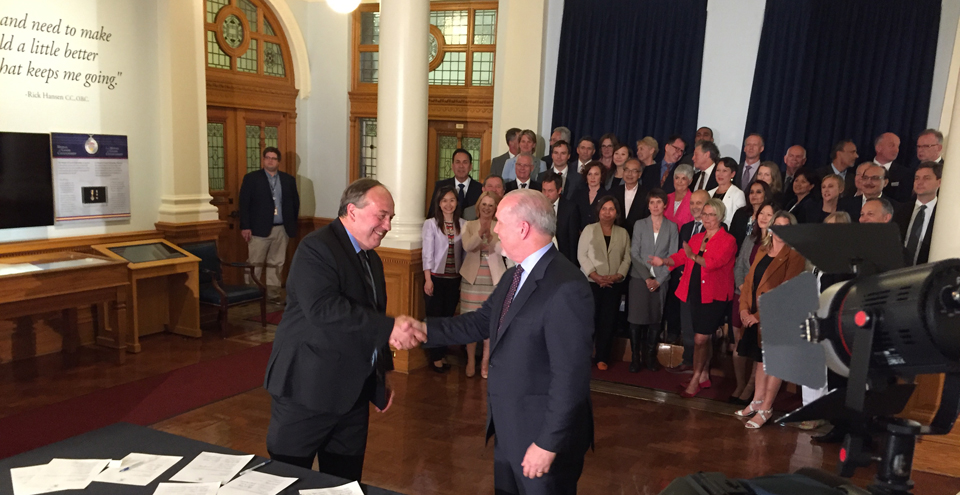With support from the BC Green Party, an NDP minority government will hold a referendum on proportional representation, reform political donation laws, move the fixed election date to the fall and increase the carbon tax.
The details were included in a 10-page document that defines where the two parties will cooperate.
“The issues we agree on are opportunities to make progress for British Columbians,” NDP leader John Horgan said at an event at the legislature where 44 MLAs from the two parties signed onto the agreement.
“There are many shared values that we have with the BC NDP,” said Green Party leader Andrew Weaver, noting that he got involved in provincial politics because of the BC Liberal government’s lack of leadership on climate change under Premier Christy Clark.
The agreement lays out how the parties will work together in good faith and with “no surprises” for each other. “Both parties agree that the legislature works best when all MLAs are able to put forward good ideas, and come together, to support those that advance the public good.”
The NDP will consult the Greens on legislation it plans to introduce, major policy issues and the broad direction of its budgets.
Specific commitments include:
* Holding a referendum on electoral reform in conjunction with the 2018 municipal election. The parties will consult British Columbians on the form of proportional representation proposed and if approved it will be in place before the next provincial election;
* Moving the fixed election date to the fall so that it will be possible to pass a budget before British Columbians vote;
* At the first sitting of the legislature they will ban corporate and union donations, as well as contributions from people who live outside the province. They will also place limits on individual contributions;
* Reviewing the Lobbyists Registration Act and increasing penalties for violations under the act;
* Raising the carbon tax by $5 per tonne per year starting on April 1, 2018 and extending it to cover fugitive emissions such as gas that escapes from pipelines and carbon from the burning of slash piles. They would also include rebate cheques so that the majority of British Columbians are better off after the tax has been raised;
* Referring the Site C dam project to the B.C. Utilities Commission so the independent regulator can look at the economic viability of the project and whether the timing is right to build it. The referral will be made as soon as an NDP government is sworn in;
* Using “every tool available” to stop the expansion of Kinder Morgan’s Trans Mountain pipeline;
* Establishing a “fair wages commission” that will work towards a $15 minimum wage, at least, and oversee regular rate reviews;
* Working with the Mayors’ council in Metro Vancouver on a transit and transportation plan;
* Dedicating a cabinet minister to “developing and implementing a mental health and addiction strategy and a youth mental health strategy”;
* Improving access to post-secondary education and reducing the cost for students;
* Investing in childcare and early childhood education;
* Designing and implementing a poverty reduction strategy. The strategy would include making housing more affordable, as well as introducing a basic income pilot project to test whether it is “an effective way to reduce poverty, improve health, housing and employment”;
* Eliminating MSP premiums.
‘The public wants change’
One major area where the NDP and Greens differ is on the NDP’s promise to eliminate the tolls on bridges in the Lower Mainland. The issue isn’t mentioned in the agreement, but the measure will be included in an NDP budget, which the Green MLAs have agreed to vote for.
Nor did the parties come to an agreement on ride-hailing services like Uber. While the Greens have supported allowing the service, the NDP has been hesitant about how it would affect the existing taxi industry. “To have that evaporate overnight is not the best way forward,” Horgan said today.
The change of government will also likely lead to the cancellation of the Massey Tunnel replacement project. Horgan said that while addressing congestion is important, the bridge is not a priority for the region’s mayors. “That’s not necessarily the best way forward,” he said.
“I believe the public wants change as quickly as possible,” he said. The Green-NDP agreement sends a message to Lieutenant-Governor Judith Guichon and to the public that the parties’ MLAs are ready to govern together, he said. “The timeline is now in the hands of Christy Clark and the lieutenant governor.”
The BC Liberals won 43 seats in the legislature, one shy of a majority in the 87 seat house. The NDP won 41 and the Greens three.
Clark today said she intends to recall the legislature and test its confidence rather than resigning immediately. She said she expects to lose a vote in the house and that the lieutenant governor would then give the NDP an opportunity to form government.
Combining the slogans from the NDP and Green campaigns, Weaver said people voted for “Change you can count on for a better B.C.” ![]()
Read more: BC Election 2017, BC Politics
















Tyee Commenting Guidelines
Comments that violate guidelines risk being deleted, and violations may result in a temporary or permanent user ban. Maintain the spirit of good conversation to stay in the discussion.
*Please note The Tyee is not a forum for spreading misinformation about COVID-19, denying its existence or minimizing its risk to public health.
Do:
Do not: